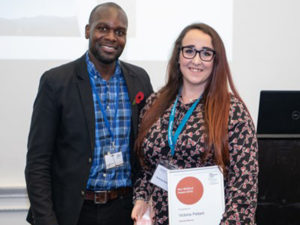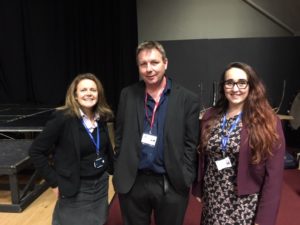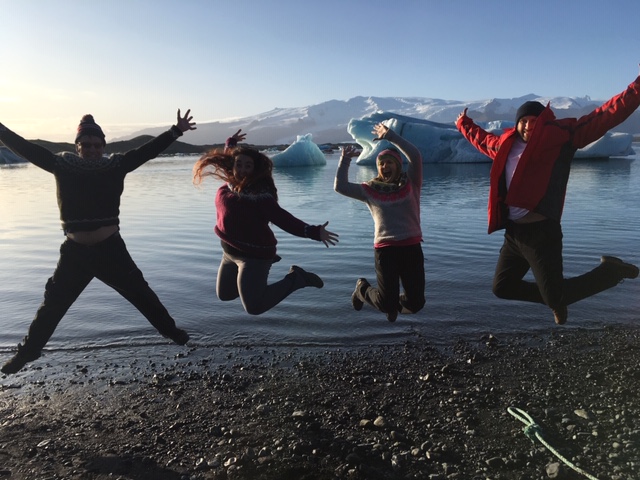Geography
Head of Department – Dr H. Fyfe
In Geography, we hope to stimulate an interest in the world around us and an understanding of the processes, both natural and human, which are changing and shaping the Earth. Students are encouraged to ask questions, carry out enquiries and develop a range of skills which will enable them to describe, analyse, interpret, present and evaluate the wide variety of data sources available.
The department has a track record of success including the Head of Department, Dr Helen Fyfe being awarded Chartered Geography status in July 2019 by the Royal Geographical Society, and Victoria Pellant awarded the RGS Rex Walford award for teachers in the early stages of their careers in October 2019, pictured below collecting her award from Dwayne Fields, a Fellow of the Royal Geographical Society, in London.
The Geography staff at TBGS also play a critical role in the running of the South Devon Geographical Association which includes a calendar of lectures for sixth-form students and the annual Worldwise Quiz for students in years 8-10. Pictured are worldwise quiz winners 2020 from TBGS Jacob, Bradley and Tom. In the last two years, lectures have included talks by Professors Iain Stewart and Danny Dorling. Dr Fyfe and Miss Pellant are pictured with Professor Danny Dorling from Oxford University who spoke about “Equality/Inequality” in his talk for the South Devon Geographical Association at TBGS in December 2019 Students also get the opportunity to go to a number of conferences organised by the University of Plymouth including the hugely popular annual Climate Change and Geohazards conferences.
Core concepts in Geography
- The places and communities in which we live and work
- Our natural environments and the pressures they face
- The interconnectedness of the world and our communities within it
- How and why the world is changing, both globally and locally
- How our individual and societal actions contribute to those changes
- The choices that exist in managing our world for the future
KS3
Students study the following topics:
Year 7
- Exploring Britain: This first topic we study aims to ensure that all students have a sound understanding of the geography of the British Isles. We investigate the political boundaries, main physical features, the weather, economy and demographic characteristics. We also get the students to look at contemporary issues such as immigration and inequality.
- Map skills: Using maps is a key skill for a Geographer and students are taught how to read maps using grid references, scale, distance, height and direction. They are also encouraged to evaluate different types of maps, acknowledging that maps can and have been used for particular purposes. Finally, students get the opportunity to use Geographical Information Systems (GIS) such as memory mapper and Google Earth. There is a half day fieldtrip during this topic in which students carry out orienteering tasks at Cockington country park in Torquay.
- Food for Thought: This topic examines current issues concerning food and farming such as the merits and problems of organic farming, genetically-modified crops, fair trade products, food miles and the environmental impacts of intensive farming. Students may produce a farm game or prepare a presentation on a current food issue.
- Rivers: Students will study the water cycle and then go on to examine how rivers shape the land. They will look at erosional and depositional processes and landforms and investigate how humans use and harm rivers. There is a one day fieldtrip where students follow the course of the River Lemon from its source at Haytor to its confluence with the River Teign and then down to the mouth of the Teign at Teignmouth. Students investigate changes in width, depth, velocity and bedload size and shape.
Year 8
- Coasts: At the start of the year students learn how coastal landforms are created and discuss the relative merits of different types of sea defence. In a study of the English Riviera Geopark they get a chance to observe these landforms, measure beach deposits and visit a variety of Geosites, including Kents Cavern, in a fieldtrip around the bay. Finally the pupils debate the ways in which coasts should be managed as climate change affects our shores.
- Development: Students find out how we can measure levels of development and learn about the historic, environmental and socio-economic reasons why a country like Ghana is less developed. Through enquiry they evaluate the success of the Millennium Development Goals and propose how we should help poorer countries in the future through the correct balance of large scale and small scale projects.
- Weather & Climate: After learning about the formation of clouds and rain students compare high and low pressure systems before practicing how to interpret weather maps and satellite images used in weather forecasts. They then examine the factors that affect climate on a global, national and local scale and attempt to measure some of these in a study of microclimates around the school site. Finally they analyse how weather and climate affects our lives and try to evaluate the possible impacts of climate change in the UK.
- Next Economic Giants: This topic examines major emerging national economies. Students research these countries in detail, which include the BRICS (Brazil, Russia, India, China and South Africa) the MINTS (Mexico, Indonesia, Nigeria, and Turkey) and the Next Eleven, all of which have the potential to become among the world’s largest economies in the 21st century.
- Environmental challenges: this topic addresses some of the environmental challenges not covered elsewhere in the curriculum. It is hoped that in covering the problem of plastic pollution, students may also be able to take part in local beach cleans and litter picks.
Year 9
- Tectonic hazards: Since our planet’s formation its crust has been dynamic and unstable. This leads to a range of challenges for human activity. Volcanoes, supervolcanoes, earthquakes and tsunamis are investigated through model construction, hazard mapping and examining contemporary examples of disaster events.
- The geography of the Middle East: In this topic, students will focus on the incredibly diverse region of the Middle East and why the area is so important. They will look at the physical landscape of the Middle East, the human geography of the region and examples of conflict and controversy in the Middle East. Students will examine the causes and impacts of ongoing conflict in parts of the Middle East as well as considering the historical and colonial factors which created tension in the twentieth century.
- The Living World: All students, irrespective of whether or not they choose to study Geography at GCSE will commence The Living World option in March of Year 9. The topic starts off by looking at small-scale ecosystems and the interaction between biotic and abiotic components. We then go on to focus on rainforests and deserts in more detail. The relationship between climate and ecosystems is examined along with plant and animal adaptations to the environment. Human activity in the tropics is discussed including the problems of deforestation and desertification. There is a one day fieldtrip to the Eden Project which allows us to study the rainforest biome in more detail and consider the global impacts of deforestation.
GCSE
Examination board – AQA
In year 10, students deepen their understanding of:
· The living world – ecosystems including rainforest and desert environments;
· The changing economic world – measuring development across the world and including a comparison of the UK and Nigeria;
· Physical landscapes in the UK – rivers and glaciers and their impact on upland and lowland areas. Fieldwork and mapping skills are developed through a field trip to Dartmoor investigate how the River Dart changes as it goes downstream.
In year 11, students explore:
· Urban issues and challenges including a one-day field trip to Bristol to investigate urban regeneration;
· The challenge of natural hazards including plate tectonics, earthquakes, tropical storms, extreme weather in the UK and climate change;
· The challenge of resource management with a focus on energy.
Sixth Form
A level
Examination board – AQA
A-Level Geography is a mixture of human and physical geography. For the physical component, students study geographical hazards, coastal systems and landscapes, and the water and carbon cycle. For the human component, students study changing places, contemporary urban environments and global systems and governance. Students build up a portfolio of lesson notes, private reading, short assignments and from field study. Students are encouraged to attend the South Devon Geographical Association termly lectures and there are a number of external speakers who come in to give talks on their specific areas of expertise, alongside a programme of fieldwork.
IB
At IB, there are 3 parts with a range of optional themes. Part 1 world Geographic themes includes Oceans and Coasts, extreme environments, and the geography of food and health. Part 2 is around perspectives and global change including population distribution, Global climate and Global resource. The core theme provides an overview of the geographic foundation for the key global issues of our times. The purpose is to provide a broad factual and conceptual introduction to the geography of population dynamics, climate change and resource consumption issues. Part 3 offers an extension focused on global interactions for HL only. There are three compulsory topics in the HL extension: Power, places and networks, Human development and diversity Global risks and resilience. Students will build up a learning portfolio compiled from lesson tasks, personal research and reading, short assignments and investigations and be encouraged to keep a blog to promote opinion and interaction.
Careers advice to students
Geography is a broad-based subject which provides lots of opportunities for future progression. For example, Geography is an obvious choice for careers in sustainability and green issues, urban regeneration, energy supply, retail location, managing the effects of hazards and climate change. For careers in the world of business, an understanding of global economics forms an important part of Geography. For those thinking of a career in law, human rights, international relations or welfare, then geography gives students the opportunity to consider relevant issues such as “How do we measure development?” and “What are the consequences of migration on societies?” For students working towards a career in medicine or veterinary science, then geography is a good choice to give the breadth that universities seek as they will gain a clear understanding of how the environment affects health and survival of people, animals and ecosystems as well as enhancing their writing skills. For those who do not have a clear idea of what career they want to pursue, geography gives them the chance to keep their options open as it covers both arts and science components.
“A knowledge of geography is an essential tool in understanding the enormously consequential and dizzyingly rapid changes our planet is going through. Geography is the one subject that looks at the whole story.” (Sir Michael Palin, Former RGS President)
Extra-curricular and opportunities
Geography students at TBGS also have a strong tradition of participating in local and national Geography-related activities. In recent years, we have had success in the Young Geographer of the Year competition, South West Geology competition and the South West Planning competition. Such activities are both enriching and enjoyable.
Biennial Iceland trip
Since 2011, the department has taken 40 students studying Geography in KS4 and KS5 to Iceland for a six day residential fieldtrip. The students do not do any actual practical fieldwork but get to experience the awe and wonder of Iceland through a guided tour of the country including a glacier walk, lava tube caving and bathing in the Blue Lagoon and geothermally heated outdoor pools.











